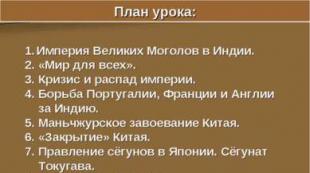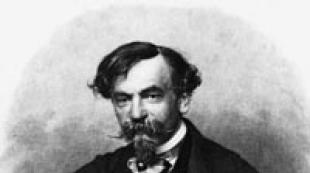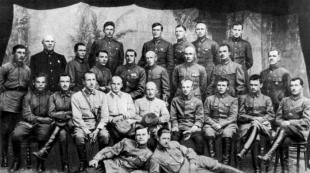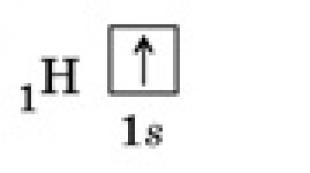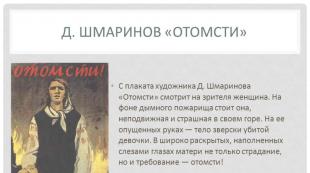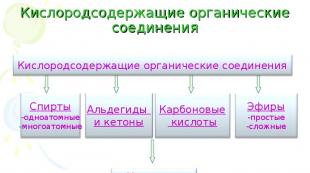Negative pronoun with an unstressed prefix. Negative pronouns in Russian. Syntactic features of negative pronouns
To indicate the absence of a sign or object, negative pronouns are used in Russian. This article provides methods for their formation, grammatical features, syntactic features with examples.
Negative pronouns in Russian– a group of pronouns that indicate the absence of an object or attribute. Answer questions Who? What? Which? Whose? and are formed using an unstressed prefix neither- and shock attachment Not- from relative and interrogative pronouns.
Examples of negative pronouns: no one, nothing, no one's, no, nothing, no one.
Grammatical features of negative pronouns
Negative pronouns have the same grammatical features as relative and interrogative pronouns.
- Negative pronouns none, no one's change by gender, number and case.
- Negative pronouns formed from pronouns who what- change only by case. Negative pronouns no one And nothing change in the same way as pronouns nobody And nothing, but do not have the form I. p.
- Pronominal adverbs are unchangeable parts of speech.
Features of the declension of negative pronouns with prepositions are given in the table.
TOP 1 articlewho are reading along with this
| Singular | Plural | ||||
| M. r. | J. b. | S. r. | |||
| I. p. | nobody, | no, | none, | none, | none, |
| R. p. | no one | none, | no, | none, | none, |
| D. p. | to no one | no way, | no, | no way, | none, |
| V. p. | no one | none/none nobody's/nobody's |
none, | none, | none/none, draws/draws |
| etc. | nobody | none, | no, | none, | none, |
| P. p. | about no one | about nothing about nobody |
about nothing about no one's |
about nothing about nobody |
about none about no one's |
Syntactic features of negative pronouns
Negative pronouns in sentences can perform any syntactic function.
Examples: Nobody didn't solve the problem ( subject). This house nobody's (part of a compound nominal predicate). None the medicine didn't help him definition). We were nothing discuss ( addition). He was nowhere sit down ( circumstance).
MORPHOLOGY
PRONOUN
Read an excerpt from the poem. What types of pronouns are used in this poem?
- Whose forest stream are you?
- But where are you from? Creek?
- From the keys!
- Well, whose keys are they?
- Whose birch tree is by the stream?
O. Bedarev
1. Using the materials from the diagram on p. 154 make a statement about negative pronouns: 1) what they mean; 2) how they are formed; 3) how they change. Check your answers with the theoretical material in the paragraph.
Negative pronouns express the absence of any person, attribute of an object, quantity: no one, nothing, no one.
Negative pronouns are formed from relative pronouns using the prefixes not-, nor-: nothing, not with anything, no one, no one, no one, to nothing, about nothing.
2. The grammatical features of negative pronouns coincide with the grammatical features of indefinite, interrogative and relative pronouns
Pronouns. Using the material on interrogative pronouns (see Exercise 369). tell us about the grammatical features of negative words. uncertain. Interrogative and relative pronouns.
Make a word-formation analysis of negative pronouns. What pronouns are they formed from?
No one, no one, no one, no, nothing.
1. Read pairs of phrases aloud to each other. Match the pronunciation of not- and neither- in the negative pronouns in each pair. In what pronouns is it impossible to make a mistake when choosing the spelling of a vowel in non-, ni-? Why? Which vowel in the prefixes of negative pronouns is written in a weak position? How do you spot a weak position?
Something strange - nothing strange; there is no one to blame - no one to blame; nothing to talk about - didn’t talk about anything; there is nothing to do - do nothing; no one to discuss - didn’t discuss it with anyone.
2. Read the rule for writing negative pronouns. Prepare to answer the questions: 1) why does the rule only talk about the prefix ni-? 2) in what case are negative pronouns written as one word?
The prefix ni - in negative pronouns - is unstressed, the letter and is written in it: no one, no one's.
If there is a preposition between neither or not and the pronoun, the pronoun is written in three words;
1. Formulate a rule using materials from the diagram. Give examples.
2. Compare the rule for writing negative pronouns for Russian and Ukrainian languages. Indicate the positions that match. Name the differences.

1. Read pairs of sentences aloud, matching the pronunciation of not-, nor- in the negative pronouns in each pair. Explain why it is impossible to make a mistake when choosing a vowel in the prefix not-? How do you determine the weak vowel position in the prefix ni-?
2. Write it down. Place stress on negative pronouns.
1. The day until the evening is boring if there is nothing to do (Proverb). Galya and I didn’t tell them anything (V. Zheleznikov). 2. I had nothing to pay with. Dahlias don’t smell like anything (V. Odnoralov). 3. Everyone can offend, but there is no one to feel sorry for (Proverb). The dog did not belong to anyone (L. Andreev).
3. Underline negative pronouns as parts of a sentence. Indicate their case.
Copy the sentences by inserting negative pronouns. Underline all parts of the sentence. Indicate the case of pronouns.
1. Katya... didn’t answer. 2. We... didn’t meet. 3. Mom... didn’t ask. 4…. there was no exact answer. 5. He... didn’t say hello.
1. Copy the sentences, writing down negative pronouns with prepositions. Outline the conditions for choosing negative pronouns.
1. (N..what, under) circumstances Igor would not refuse to speak (A. Rybakov). 2. A person who is not known (by anyone, with) is completely stupid (Proverb). 3. There was no more money with (n..who, y) (N. Nadezhdina). 4. (N..whom, at) there was no (n..) any doubt (A. Rybakov). 5. I never think (by anyone, with) this has happened (A. Bitov).
2. Do morphological analysis one negative pronoun.
Copy the phrases by opening the brackets and inserting the missing letters. Graphically explain the spelling of the prefix pri-, roots with alternation.
(N..)what not to..to..touch. (n..)why not pr..k..sleep. (n..) why live..l.. (n..) not to offer to anyone. (n..)who doesn’t pr..b..fight, (n..)who doesn’t pr..b..ret, (n..)why pr..p..fight. (n..) why bother?
1. Copy the sentences by inserting the missing letters and opening the brackets. Place punctuation marks.
2. In words with missing letters, indicate the spelling patterns. Explain the spelling without words.
1. In just two weeks, I think (n..) what (not) will change. 2. Mom for some reason (never) wanted to believe that I had at least some (any) economic abilities (A. Aleksin). 3. We need to make a (small) big break somewhere and discuss the further route. 4. I realized... little that I should tidy up the room and, first of all, have something to eat, but from anxiety I (n..) had no use for what (not) my hands. Every now and then I climbed onto the windowsill (Yu. Sotnik).
2. Make a morphological analysis of one pronoun.
1. Write down the text from dictation.
2. Exchange notebooks and, without relying on printed text, check each other’s work, correcting mistakes with a colored pen.
3. Exchange notebooks again. Check your work by referring to the printed text. If there are errors, correct them and explain them graphically.
The day went well, but at night Masha fell ill. They sent to the city for a doctor. He arrived in the evening and found the patient delirious. A severe fever developed, and the poor patient was at the edge of the coffin for two weeks.
No one in the house knew about the intended escape. Her maid didn't tell anyone anything
L. Pushkin
4. Indicate in the text outdated words. What words correspond to them in modern Russian?
Test your knowledge
401 “The fourth wheel”
1. N..who doesn’t know; n..what is not needed; n..why be surprised; n..that won't help.
2. (Not) anyone, (not) by whom, (not) anything, (not) with (anything).
1. Using materials from the diagram of us. 154. Fill in the blanks in the table, selecting interrogative, indefinite, negative pronouns that correspond to relative pronouns. Suggest a rational way to memorize relative, interrogative, indefinite, and negative pronouns.
Relative Pronouns | Interrogative Pronouns | Undefined Pronouns | Negative Pronouns |
Somebody, somebody, somebody, somebody, somebody | No one, no one, no one, no one, no one, no one, no one |
||
..., something, ..., someone,... | Nothing, nothing, nothing, nothing, ..., ..., ..., ... |
||
Some kind of... .., …, …, | |||
2. Analyze examples of pronouns. What is the peculiarity of the formation of indefinite and negative pronouns?
3. Which pronouns do you think might be difficult to spell? What specific difficulties arise when choosing the spelling of these pronouns?
1. Copy the text by inserting the missing letters and opening the brackets.
2. Underline the pronouns as parts of the sentence. Indicate their rank.
(N..)how many days did I wander around the city with my movie camera, waiting for some (some) incident to happen, but (n..) nothing happened. I bothered all my relatives and friends, asking them if some interesting event was being prepared, but I never found out what.
Yu. Sotnik
Similar posts:
HAPPY NEW YEAR! Look at the drawing. What are the children doing? Tell. Read, filling in the missing words. Learn it by heart. If there were Legs, she would run along the path. She started dancing...
Lesson 52. DESIGNATING UNPROUNDABLE CONSONANTS AT THE ROOT OF A WORD We improve the ability to correctly write words and designate unpronounceable consonants at the root of a word 333. Read. What season...
WE MEET SPRING Read the fairy tale by Nikolai Sladkov. THE BEAR AND THE SUN Water seeped into the den and wet the bear’s pants. - May you, slush, dry up completely! - swore...
LANGUAGE PRONOUN § 38. PRONOUN. GENERAL MEANING, MORPHOLOGICAL FEATURES, SYNTACTIC ROLE. CLASSES OF PRONOUNS BY MEANING MATERIAL FOR OBSERVATION AND REFLECTION Read the riddles. 1. She accepted...
SOUNDS AND LETTERS. SYLLABLE. Stress LESSONS 31 – 33 CONSONANT SOUNDS. LABELING THEM ON THE LETTER. HARD AND SOFT CONSONANTS 167 Read the riddle fairy tale. One day everyone gathered...
1st grade Syllable. Emphasis. Sounds and letters Vowel sounds and their designation in writing. Dividing a word into syllables. Emphasis. Word wrap. VOCABULARY DICTANTS 1. Write down...
MORPHOLOGY TYPES AND STYLES OF SPEECH §60 Official business style. Advertisement 476 1. What do you know about formal business style of speech? When the need arises to build your speech, adhering to...
3. SOUNDS AND LETTERS OF SYLLABLES. WORD TRANSFER 13 What is a syllable made of? Are all words divided into syllables? Dividing words into syllables and parts...
44. Phraseologisms (continued). Listen: determine the structure of the text. We speak: we act out a dialogue 354. Distribute these phraseological units into groups in accordance with their general meaning: 1) very few,...
Grade 2 Sounds and letters Soft sign (ь) in the middle and at the end of words WARNING DICTS 1. Write down and read the words. I. Boy, schoolboy, sparrows,...
Grade 4 Parts of speech Adverbs CREATIVE AND SELECTIVE DICTATS 1. Write down the adverbs, next to them write down the adjectives from which they are derived. NATIVE WORD Our language is modest,...
Grade 4 Parts of speech Adjective Nominative and accusative cases of adjectives WARNING DICTS 1. Write down combinations of words. Ask questions about adjectives. Blue distance -...
32. We read: we find common and different things in the content of the texts. We speak: we compose a statement based on the text and life experience 255. Read about how they celebrate...
MORPHOLOGY INFORMATION ABOUT SPEECH. SPEECH ACTIVITY §47 Detailed presentation of a popular science text of a narrative nature 433 1. Read the text. Determine its topic and main idea. Which reflects...
Lesson 61. GENRES OF FICTION Learning to distinguish between genres works of art 390. Read the tongue twister, gradually accelerating the pace of reading. The swans and the swans were flying. Explain the spelling of words with...
Lesson 10 Letter o We learn to correctly pronounce and write words with o under stress and in unstressed position 67. Speech warm-up. Repeat after the teacher, correct...
Grade 4 Parts of speech Verb I and II conjugations of verbs CHECK WRITING 1. Write down the verbs. Indicate endings in them, put emphasis. We read, you lead, we write, you help,...
MORPHOLOGY PRONOUN A pronoun is an independent part of speech that indicates objects, signs or quantity, but does not name them: I, he, his, myself, that, no one,...
Lesson 11. COMPOSING SENTENCES AND COMBINING THEM INTO A CONNECTED STATEMENT We develop the ability to compose text from sentences 62. Read and write down the proverb. Explain its meaning. Politeness...
23. Listen: imagine what is described in the work. We read silently: we divide the text into parts according to content. We speak: we retell the text, using words that denote an emotional assessment of events. 183. Listen...
GOOD RAIN ON A VISIT TO SUMMER One day I was walking along a forest path, Suddenly I felt the rain coming behind me. I quickened my pace - hurry home!...
SENTENCE LESSONS 53 – 55 WHAT IS A SENTENCE 280 Read. Who are we talking about here? The sea turtle moves in the water very deftly. What have we learned about...
LANGUAGE MORPHOLOGY NOUN § 12. PROPER AND DENIAL NOUNS MATERIAL FOR OBSERVATION AND REFLECTION Read these words and combinations of words. Think and say...
6. WORD OBJECTS, SIGNS AND ACTIONS 1 1. Read expressively the poem by B. Zakhoder “The Whale and the Cat”. There is no order in this tale: Every word is...
Lesson 69. LISTENING TEST. CONTROL AUDITORY DICTANT We test the ability to listen and understand a statement, write the text correctly under dictation 435. Control listening. Listen to the text read...
Lesson 53. WRITING WORDS WITH DOUBLE CONSONANTS AT THE ROOT OF A WORD We improve the ability to correctly write words with double consonants at the root of a word 340. Read the sayings. How...
Grade 4 Parts of speech Adjective Prepositional case of adjectives WARNING DICTS 1. Write down and read combinations of words. Ask questions about adjectives. On a high mountain ash...
HAPPY NEW YEAR! L Brother - take a corner - coal They make a nest Sew an apron Sew Whose I Bue Draw I Drink Friends After b the letters i, yu,...
HAPPY NEW YEAR! LEARNING TO BE FRIENDS Dear friends! Of course, you love competitive games. It can be so much fun! Whose team will win? After all, every team wants to be the first to run, jump,...
Grade 2 Parts of speech Capital letters in first names, patronymics, last names of people, names of animals and in geographical names WARNING DICTS 1. Write down and read the words. Tanya...
2nd grade Word composition. Words with the same root CHECK WRITING 1. Find and identify the common part in the highlighted words - the root. SUMMER It was a wonderful summer day. Bright...
Lesson 59 Thematic groups of words We learn to identify and select words that belong to different thematic groups 423. Read the poem expressively. What mood is it permeated with? Grass...
NOT AND NOR IN NEGATIVE PRONOUNS
Not- And neither- . They express the absence of something: an object, a sign, a quantity.
Console Not- always percussion, prefix neither- unstressed.
Negative pronouns change by case. Pronouns no one, nothing do not have a nominative case.
1 . Write down, following the example of no one - whose, how these words are formed.
Make 2-3 sentences with any of these words.No one, no one, no one, nothing, nothing, no one.
2 . How do you understand the meaning of the poem called “Nothing”? How to pronounce this word?
Nothing
- What did you buy?- Nothing!
- What did you cook?
- Nothing!
- What are you chewing?
- Nothing?
- How do you live?
- Nothing!
- Unclear,
For what
It takes so much
Nothing!
- If there is a lot of nothing,
It's not a pity Nothing!
what [in]
nothing [in]
no one [in]
no one [in] about
nothing [in] about
N
IR Wow.№ 45.
3
. Not orneither ? Write it off. Indicate the choice conditions not and neither in negative pronouns (see example in the box). Indicate the cases of negative pronouns.1. Why should anyone be afraid (t, t)sya, who doesn’t..why (not) fight (t, t)sya. 2. Even if you put on a (not) rash, you still have nothing to do with it. 3. If you haven’t (not) learned anything in a day, you’ve lived the day in vain. 4. No one will (not) say thank you for your wasted work.
4 5. (Don’t) be swayed by anyone’s praises.(Proverbs.)
If the predicate has a particle
Not , then a negative pronoun withneither reinforces the negative meaning of the sentence.4
. Insert negative pronouns to strengthen the negation. Emphasize the additions. Indicate their case.Sample:
Valek - (did not) answer.
Marusya - - (not) recognized..vala.
Father - - still (didn’t) know.
And you still - - haven’t yet... chatted, where are you going?
(According to V. Korolenko.)
5
. Write down indicating the conditions of choiceNot Andneither in negative pronouns.1. I dressed myself up and dressed myself up, but... for no good. 2. A friend is a (n, nn) treasure, (not) a friend (no one) is happy. 3. Anyone can be offended, but please...let no one. 4. They love someone who doesn’t... offend... anyone.
(Proverbs.)
Consider examples. When do negative pronouns have separate spellings?
I. - nothing
R. - nothing, nothing
D. - nothing, no use
V. - nothing, no matter what, no way
T. - nothing, with nothing, before nothing
P. - about nothing, on nothing
N
and y to Wow. Ne s k eat.№ 46.
6
. Write down negative pronouns with prepositions. Indicate the conditions for choosing continuous and separate writingNot and neither in negative pronouns (see example in box). Make up phrases or sentences with the words you receive.No one (c). Nothing (in). No one(s). Nothing (for). Nobody (from). Nothing (before).
7
. Write down the negative pronouns along with the words they are associated with in two columns: in the first - continuous spellings, in the second - separate spellings. In the written phrases, indicate the main word.1. (N..)what (n..)what (not)did..sh. 2. Those who have become separated from friends and comrades have no one to count on in trouble. 3. Stupid
3 at all, who (n..) is known (n..) (with) whom. 4. Boring 3 day until evening, if you do (n..) what. 5. (N..) (in) why is the national character so freely (not) manifested, as in songs.. and dances.. . 6. One (not) replace one’s own mother.. 7. (Not) (with) whom to ask when you yourself are to blame.8
. Make up phrases “verb + negative pronoun with preposition” with these verbs. Indicate the case of pronouns. Select words with the same root for the highlighted word and write them down according to the model (see exercise 112).(Not)
disappointed - -. (Not) touched.. touched - -. (Not) understood - -. (Not)ra..asks - -. (Not) calculates - -. (Not) study (?) - -. (Not) .. will turn off - -.9
. Write down, indicating the conditions for combined and separate writingNot and neither.1. (Not) about..to anyone (not) about..to. 2. Whoever is used to scolding(?) himself will not.. get along(?) with anyone. 3. Whoever pos(?)but comes..t (doesn’t) find anything..t.
(Proverbs.)
10
. Together or separately?Not or neither? Write it down, indicating the spelling “Fused and separate writing Not Andneither in negative pronouns."(N..) hurry to grab with your hands (n..) what is on the plate.
(N..) push (n..) someone who is sitting next to you, under the elbow.
(N..) talk loudly (n..) to someone, (n..) try to (n..) shout someone down.
From what pronouns and with what help are negative pronouns formed? Which prefix in these pronouns is always unstressed and which is stressed? Why are these pronouns called negative?
Negative pronouns change by case. The pronouns nogogo, nogogo have no nominative case.
1. Write down according to the example how these words are formed.
Sample: no one's ← whose.
No one, no one, no one, nothing, nothing, no one.
Make 2-3 sentences with any of these words.
In negative pronouns, the prefix ni is unstressed, and the prefix not is only stressed.
2. Not or neither? Write it off. Indicate the spelling. Indicate the cases of negative pronouns. N..why should he be afraid (t, t)sya, who don’t..why (not) fight (t, t)sya. 2. Even if you put on a (not) rash, you still have nothing to do with it. 3. If you haven’t learned anything in a day, you’ve lived the day in vain. 4. No one will (not) say thank you for your wasted work. 5. Do not exalt yourself with anyone’s praises. (Proverbs.)
3. If there is a particle not with the predicate, then the negative pronoun with nor strengthens the negative meaning of the sentence.
Insert negative pronouns to strengthen the negation. Emphasize the additions. Indicate their case.
Sample: This item no one need not.
1. Valek - - (did not) answer. 2. Marusya - - (not) recognized..vala. 3. Father - - has (not) found out yet. 4. And you still - - still (not) chatted, where are you going?
(According to V. G. Korolenko.)
Review the table. When do negative pronouns have separate spellings?
| I. - nothing R. - nothing, nothing D. - nothing, no use |
V. - nothing, no matter what, no way T. - nothing, with nothing, before nothing P. - about nothing, on nothing. |
If neither and are not separated by a preposition, then they are written separately in negative pronouns.
4. Write down negative pronouns with prepositions. Indicate the spelling. Make up phrases or sentences with the words you receive.
Sample: Nothing (because of).- Not because of Why should you quarrel?
No one (c). Nothing (in). No one(s). Nothing (for). Nobody (from). Nothing (before).
5. Write down the negative pronouns along with the words with which they are associated in two columns: in the first - continuous spellings, in the second - separate spellings. In the written phrases, indicate the main word.
1. (N..)what (n..)what (not)did..sh. 2. He who has become separated from friends and comrades has (not) someone to count on in trouble. 3. A person who (n..) knows (n..) (with) whom is completely stupid. 4. The day until the evening is boring, if there is (n..) anything to do. 5. (N..) (in) why is the national character so freely (not) manifested, as in songs.. and dances.. . 6. One’s own mother (n..) is (not) replaced. 7. (Don’t) ask anyone when you yourself are to blame.
Write down the remaining words with gaps, indicate the spelling patterns in them.
6. Make up phrases “verb + negative pronoun with preposition” with these verbs. Indicate the case of pronouns.
(Not) disappointed- - . (Not) touched..touched - - . (Not) sorted out - - . (Not) ra..asks - - . (Not) calculates - - . (Not) participating - -. (Not) pr..will turn off - - .
Choose words with the same root for the highlighted word and write them down.
7. Together or separately? Not or neither? Write down, label the spellings , .
1. At the table (n..) whoever we have is not superfluous, everyone is rewarded according to his deserts. 2. Our youth is pure and proud, (not) to bring it to its knees (n..) to (n..) (for) what, never. 3. (N..) what power in the world.. will (not) turn us off the roads. 4. We (n..) whom and (n..) what are we afraid of..? 5. He who was (n..) something will become everything.
8. Write down nouns, adjectives, verbs in two columns.
They write together. | They are written separately.
Indicate sentences with homogeneous predicates.
9. Dictation. In what meaning is the word fun used? Indicate the spelling.
Johnny.
Lived into the world.. Johnny,
Do you know him?
Johnny (didn't) have it
Exactly (n..)what!
(N..) what to eat,
(N..) what to wear,
(Not) anything to strive for,
(not) anything to regret,
(Not) anything to be afraid of,
(Nothing to lose…
Life is fun
(Nothing to say!
Negative pronouns are formed from interrogatives using prefixes Not- And neither-. They express the absence of something: an object, a sign, a quantity.
Console Not- always percussion, prefix neither- unstressed.
Negative pronouns change by case. Pronouns no one, nothing do not have a nominative case.
419 . Write down, following the example of no one - whose, how these words are formed.
what [in]
nothing [in]
no one [in]
no one [in] about
nothing [in] about
421 . Not or neither? Write it off. Indicate the choice conditions not and neither in negative pronouns (see example in the box). Indicate the cases of negative pronouns.
1. Why should anyone be afraid (t, t)sya, who doesn’t..why (not) fight (t, t)sya. 2. Even if you put on a (not) rash, you still have nothing to do with it. 3. If you haven’t learned anything in a day, you’ve lived the day in vain. 4. No one will (not) say thank you for your wasted work. 4 5. (Don’t) be swayed by anyone’s praises.
(Proverbs.)
If the predicate has a particle Not, then a negative pronoun with neither reinforces the negative meaning of the sentence.
422 . Insert negative pronouns to strengthen the negation. Emphasize the additions. Indicate their case.
Sample:
- Valek - (did not) answer.
- Marusya - - (not) recognized..vala.
- Father - - still (didn’t) know.
- And you still - - have (not) talked yet, where are you going?
(According to V. Korolenko.)
423 . Write down indicating the conditions of choice Not And neither in negative pronouns.
1. I dressed myself up and dressed myself up, but... for no good. 2. A friend is a (n, nn) treasure, (not) a friend (no one) is happy. 3. Anyone can be offended, but please...let no one. 4. They love someone who doesn’t... offend... anyone.
(Proverbs.)
Consider examples. When do negative pronouns have separate spellings?
I. - nothing
R. - nothing, nothing
D. - nothing, no use
V. - nothing, no matter what, no way
T. - nothing, with nothing, before nothing
P. - about nothing, on nothing
424 . Write down negative pronouns with prepositions. Indicate the conditions for choosing continuous and separate writing Not and neither in negative pronouns (see example in box). Make up phrases or sentences with the words you receive.
No one (c). Nothing (in). No one(s). Nothing (for). Nobody (from). Nothing (before).
425 . Write down the negative pronouns along with the words with which they are associated in two columns: in the first - continuous spellings, in the second - separate spellings. In the written phrases, indicate the main word.
1. (N..)what (n..)what (not)did..sh. 2. Those who have become separated from friends and comrades have no one to count on in trouble. 3. Stupid 3 at all, who (n..) knows (n..) (with) whom. 4. The 3rd day until the evening is boring, if there is (n..) anything to do. 5. (N..) (in) why is the national character so freely (not) manifested, as in songs.. and dances.. . 6. One (not) replace one’s own mother.. 7. (Not) (with) whom to ask when you yourself are to blame.
426 . Make up phrases “verb + negative pronoun with preposition” with these verbs. Indicate the case of pronouns. Select words with the same root for the highlighted word and write them down according to the model (see exercise 112).
(Not) disappointed- -. (Not) touched.. touched - -. (Not) understood - -. (Not)ra..asks - -. (Not) calculates - -. (Not) study (?) - -. (Not) .. will turn off - -.
427 . Write down, indicating the conditions for combined and separate writing Not and neither.
1. (Not) about..to anyone (not) about..to. 2. Whoever is used to scolding(?) himself will not.. get along(?) with anyone. 3. Whoever pos(?)but comes..t (doesn’t) find anything..t.
(Proverbs.)
428 . Together or separately? Not or neither? Write it down, indicating the spelling “Combined and separate spellings” Not And neither
- (N..) hurry to grab with your hands (n..) what is on the plate.
- (N..) push (n..) someone who is sitting next to you, under the elbow.
- (N..) talk loudly (n..) to someone, (n..) try to (n..) shout someone down.
429 . Write down nouns, adjectives, verbs in two columns.
Continuous writing | Separate writing
Indicate sentences with homogeneous predicates.
1. Working life (not) hunched over, but even straightened up my mother, taught me to face (adversity) with my breast, (n..) who and (n..) what (not) to be afraid of, (n..) ( on whom to (not) depend and trust in your own hands. 2. My friend (n..) (in) what (n..) refused (not) anyone, helped young people 3, he (didn’t) have a minute of free 2 time 3. 3. Our neighbor was a man (not) verbose, and (n..) who (didn’t) know that he had accomplished a feat.
430 . Dictation. Indicate the conditions for choosing a spelling " Not And neither in negative pronouns."
1. A strange, quiet, but (not) similar intermittent sound was heard somewhere very nearby. 2. Although Petya did something on the mulberry tree, he (n..) whom and (n..) what (n..) saw..l. 3. (No) needless to say, how happy Petya was at the invitation to go on a fishing boat. 4. It seemed that a man drowning in the sea could not rely on anyone. 5. (N..) how (n..) differed Rodion Zhukov from the sailors of the mutinous ship.
